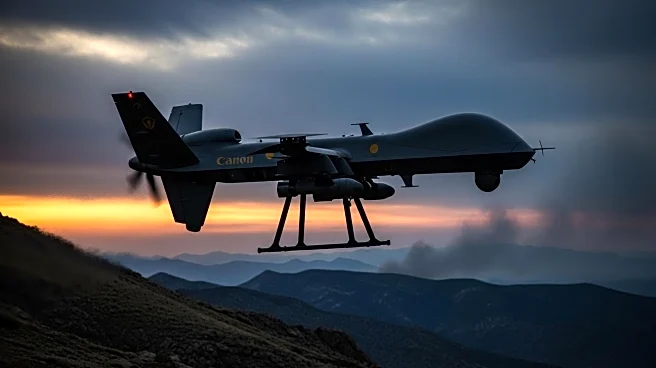What's Happening?
Israel carried out airstrikes on southern Lebanon early Saturday, targeting a location in the village of Msayleh that sold heavy machinery. The strikes resulted in the death of one Syrian citizen and injuries to seven individuals, including six Lebanese nationals and one Syrian. The Israeli military stated that the site was used to store machinery intended for rebuilding infrastructure for Hezbollah, a militant group. The airstrikes briefly disrupted a highway connecting Beirut with southern Lebanon. This action follows a pattern of almost daily airstrikes by Israel since the end of the 14-month Israel-Hezbollah war, which concluded with a U.S.-brokered ceasefire in late November. The conflict had previously resulted in significant casualties and destruction in Lebanon.
Why It's Important?
The ongoing airstrikes by Israel in Lebanon highlight the fragile state of peace in the region following the recent Israel-Hezbollah war. The conflict has had a profound impact on Lebanon, with over 4,000 fatalities and substantial economic damage estimated at $11 billion. The continued military actions by Israel are aimed at preventing Hezbollah from rebuilding its capabilities, which poses a threat to regional stability. The situation underscores the need for renewed diplomatic efforts to establish a lasting peace and prevent further civilian casualties and infrastructure damage. The international community, including the United Nations, has called for a permanent end to hostilities to ensure the safety and security of civilians in Lebanon.
What's Next?
The ongoing military actions by Israel are likely to continue as long as Hezbollah is perceived to be rebuilding its military capabilities. This could lead to further escalation and potential retaliation from Hezbollah, increasing the risk of renewed conflict. Diplomatic efforts may be intensified by international stakeholders to broker a more permanent peace agreement. The United Nations and other international bodies may increase pressure on both parties to adhere to the ceasefire and engage in constructive dialogue. Monitoring of the situation by global human rights organizations will be crucial to ensure compliance with international humanitarian laws.
Beyond the Headlines
The airstrikes in Lebanon raise ethical and legal questions regarding the use of military force in civilian areas and the impact on non-combatants. The destruction of infrastructure and civilian casualties could lead to long-term socio-economic challenges for Lebanon, affecting its recovery and development. The situation also highlights the broader geopolitical dynamics in the Middle East, where regional powers and international actors have vested interests. The conflict could influence U.S. foreign policy decisions and its role in mediating peace in the region.









